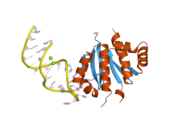NOVA1
An Error has occurred retrieving Wikidata item for infobox RNA-binding protein Nova-1 is a protein that in humans is encoded by the NOVA1 gene.[1][2]
This gene encodes a neuron-specific RNA-binding protein, a member of the Nova family of paraneoplastic disease antigens, that is recognized and inhibited by paraneoplastic antibodies. These antibodies are found in the sera of patients with paraneoplastic opsoclonus-ataxia, breast cancer, and small cell lung cancer. Alternatively spliced transcripts encoding distinct isoforms have been described.[2] Both Neanderthals and Denisovans had one version and nearly all modern humans had another suggesting positive selection. Insertion of Neanderthal gene variant of the neuro-oncological ventral antigen 1 (NOVA1) gene into human cortical organoids promoted slower development and higher surface complexity in the brain models.[3]
References
- ^ Buckanovich RJ, Yang YY, Darnell RB (Feb 1996). "The onconeural antigen Nova-1 is a neuron-specific RNA-binding protein, the activity of which is inhibited by paraneoplastic antibodies". J Neurosci. 16 (3): 1114–22. doi:10.1523/JNEUROSCI.16-03-01114.1996. PMC 6578795. PMID 8558240.
- ^ a b "Entrez Gene: NOVA1 neuro-oncological ventral antigen 1".
- ^ "Neanderthal Gene Variant Alters Neurodevelopment in Human Brain Organoids". 11 February 2021.
Further reading
- Buckanovich RJ, Posner JB, Darnell RB (1993). "Nova, the paraneoplastic Ri antigen, is homologous to an RNA-binding protein and is specifically expressed in the developing motor system". Neuron. 11 (4): 657–72. doi:10.1016/0896-6273(93)90077-5. PMID 8398153. S2CID 22554933.
- Buckanovich RJ, Darnell RB (1997). "The neuronal RNA binding protein Nova-1 recognizes specific RNA targets in vitro and in vivo". Mol. Cell. Biol. 17 (6): 3194–201. doi:10.1128/MCB.17.6.3194. PMC 232172. PMID 9154818.
- Lewis HA, Chen H, Edo C, et al. (1999). "Crystal structures of Nova-1 and Nova-2 K-homology RNA-binding domains". Structure. 7 (2): 191–203. doi:10.1016/S0969-2126(99)80025-2. PMID 10368286.
- Jensen KB, Dredge BK, Stefani G, et al. (2000). "Nova-1 regulates neuron-specific alternative splicing and is essential for neuronal viability". Neuron. 25 (2): 359–71. doi:10.1016/S0896-6273(00)80900-9. PMID 10719891.
- Dias Neto E, Correa RG, Verjovski-Almeida S, et al. (2000). "Shotgun sequencing of the human transcriptome with ORF expressed sequence tags". Proc. Natl. Acad. Sci. U.S.A. 97 (7): 3491–6. Bibcode:2000PNAS...97.3491D. doi:10.1073/pnas.97.7.3491. PMC 16267. PMID 10737800.
- Strausberg RL, Feingold EA, Grouse LH, et al. (2003). "Generation and initial analysis of more than 15,000 full-length human and mouse cDNA sequences". Proc. Natl. Acad. Sci. U.S.A. 99 (26): 16899–903. Bibcode:2002PNAS...9916899M. doi:10.1073/pnas.242603899. PMC 139241. PMID 12477932.
- Dredge BK, Darnell RB (2003). "Nova regulates GABA(A) receptor gamma2 alternative splicing via a distal downstream UCAU-rich intronic splicing enhancer". Mol. Cell. Biol. 23 (13): 4687–700. doi:10.1128/MCB.23.13.4687-4700.2003. PMC 164843. PMID 12808107.
- Brandenberger R, Wei H, Zhang S, et al. (2005). "Transcriptome characterization elucidates signaling networks that control human ES cell growth and differentiation". Nat. Biotechnol. 22 (6): 707–16. doi:10.1038/nbt971. PMID 15146197. S2CID 27764390.
- Gerhard DS, Wagner L, Feingold EA, et al. (2004). "The status, quality, and expansion of the NIH full-length cDNA project: the Mammalian Gene Collection (MGC)". Genome Res. 14 (10B): 2121–7. doi:10.1101/gr.2596504. PMC 528928. PMID 15489334.
- Ule J, Ule A, Spencer J, et al. (2005). "Nova regulates brain-specific splicing to shape the synapse". Nat. Genet. 37 (8): 844–52. doi:10.1038/ng1610. PMID 16041372. S2CID 8446567.
- Lim J, Hao T, Shaw C, et al. (2006). "A protein-protein interaction network for human inherited ataxias and disorders of Purkinje cell degeneration". Cell. 125 (4): 801–14. doi:10.1016/j.cell.2006.03.032. PMID 16713569.



